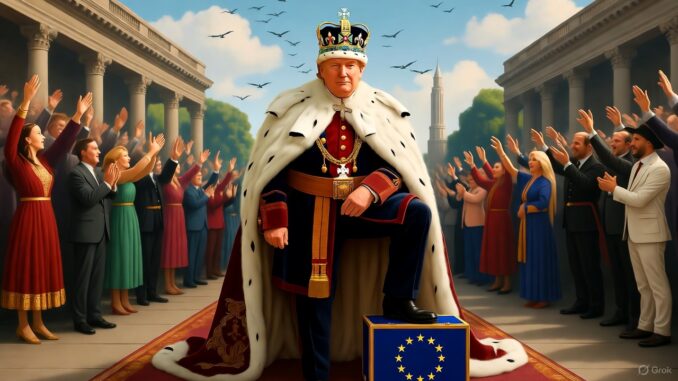
In a world where unelected bureaucrats at the United Nations push for sweeping environmental regulations that often amount to little more than wealth redistribution schemes, President Donald Trump’s no-nonsense approach has once again delivered a win for everyday consumers. The recent delay in the UN’s proposed global maritime carbon tax—dubbed by Trump himself as the “Global Green New Scam Tax”—is a prime example of how standing up to international overreach can prevent unnecessary costs from trickling down to American households and businesses.
This victory doesn’t stand alone; it’s intertwined with broader energy dynamics, including Qatar’s bold defiance of the EU’s Corporate Sustainability Due Diligence Directive (CSDDD), the potential ripple effects on US energy suppliers, and even the evolving situation in Ukraine. Let’s break it down and see how these pieces connect to real savings at the pump and on utility bills.
Trump’s Pushback Halts the UN’s Maritime Carbon Tax Onslaught
The International Maritime Organization (IMO), a UN agency, was on the verge of imposing the world’s first global carbon tax on shipping emissions. This measure, part of the so-called “Net-Zero Framework,” would have slapped fees on international shipping to fund green transitions in developing countries—essentially a backdoor tax hike that could add billions to global trade costs. Estimates suggested it might generate up to $80 billion annually, much of which would flow to climate funds rather than directly reducing emissions. For US consumers, this translates to higher prices on everything from imported goods to fuel, as shipping accounts for about 3% of global CO2 emissions but carries 90% of world trade.
Enter Trump. In a coordinated US-led campaign, the administration rallied allies like Saudi Arabia and Singapore to delay the vote.
Sorry thought this was funny from James Woods:
Terrify a liberal today… pic.twitter.com/jUYDuNXdeZ
— James Woods (@RealJamesWoods) October 18, 2025
On October 17, 2025, the IMO bowed to pressure, postponing approval by a full year in a 57-49 vote with 21 abstentions.
Trump publicly blasted the plan, stating the US “will NOT stand for this Global Green New Scam Tax on Shipping, and will not adhere to it in any way, shape, or form.”
This isn’t just rhetoric—it’s a direct intervention that spares American families from inflated costs. Without this delay, experts projected an average increase of 10-20% in shipping fees, which would inevitably pass through to consumers via higher retail prices.
Trump’s track record of withdrawing from the Paris Agreement in his first term set the stage; now, his second administration is extending that skepticism to UN schemes that prioritize globalist agendas over economic reality.
Qatar’s Rebellion Against EU’s CSDDD: A Boon for US Energy Exports
Meanwhile, across the Atlantic, the EU’s aggressive green policies are backfiring spectacularly. The Corporate Sustainability Due Diligence Directive (CSDDD), which took effect in July 2024, mandates that large companies—including non-EU ones doing business in Europe—scrutinize their supply chains for human rights abuses and environmental damage.
Penalties can reach 5% of global revenue, a hammer that Qatar’s Energy Minister Saad Sherida al-Kaabi has called “overreaching” and “unjustifiable.”
Al-Kaabi, who also heads QatarEnergy, has threatened to halt LNG shipments to the EU if fines are imposed, arguing that the directive’s climate transition requirements clash with Qatar’s energy strategy.
Qatar supplies 12-14% of Europe’s LNG, a critical lifeline since the Ukraine conflict disrupted Russian gas flows.
If Qatar follows through, EU energy prices could spike, forcing the bloc to turn elsewhere—namely, to reliable US suppliers. This plays right into Trump’s hands. A recent US-EU trade framework, announced in August 2025, commits the EU to purchasing $750 billion in American energy products, including LNG and oil.
Critics argue this deal effectively softens CSDDD enforcement on US firms, reducing administrative burdens and avoiding the directive’s full sting.
For US consumers, this means stable domestic energy markets: increased exports keep American producers thriving without passing compliance costs onto households. Without Trump’s influence in negotiating such deals, US energy companies might face EU-mandated audits and fines, potentially adding 2-5% to operational costs that could inflate consumer prices.
The UN’s maritime tax delay amplifies this. If the tax had passed, it could have pressured EU leaders to double down on CSDDD-like rules for shipping, indirectly forcing US suppliers into costly compliance. Trump’s blockade prevents that chain reaction, keeping energy affordable.
The Ukraine War’s Potential End: Easing EU Pressure and Consumer Burdens
Adding another layer is the prospect of an end to the Ukraine war, which has reshaped global energy flows since 2022. Russia’s invasion prompted the EU to slash dependence on Russian gas, accelerating green transitions and diversification toward LNG from the US and Qatar. But if hostilities cease—perhaps under Trump’s promised “deal-making” with Putin—the EU might revisit ties with cheaper Russian energy.
Early analyses suggest a post-war scenario could reduce EU energy costs by 15-20%, as normalized supplies stabilize markets.
This shift would likely temper the EU’s zeal for punitive green directives like CSDDD, as economic recovery takes precedence over ideological mandates. For the US, less EU pressure means fewer attempts to “force” American suppliers into extraterritorial compliance, avoiding added carbon tax-like costs. Trump’s administration has already signaled tariffs on non-compliant nations, further insulating US consumers.
In a post-Ukraine world, global energy markets could see a 10% drop in LNG prices, directly benefiting American importers and exporters alike.
The end result? Lower utility bills and fuel costs, courtesy of reduced international tensions and regulatory overreach.
The Bottom Line: Savings for the Average Consumer
Trump’s decisive action against the UN’s green tax scam isn’t just a policy win—it’s a pocketbook victory. By delaying the maritime carbon levy, he’s prevented an estimated $5-10 annual increase per household in shipping-related costs. Coupled with Qatar’s CSDDD pushback and the Ukraine wildcard, these developments shield US energy from EU overregulation, potentially saving consumers billions in avoided compliance fees and price hikes. In an era of inflated “green” mandates, this resistance ensures energy remains abundant and affordable, proving that strong leadership can cut through the bureaucratic fog to deliver real relief.
As the Energy News Beat has long argued, true sustainability comes from innovation and market freedom, not globalist taxes. Oh, and a side note, we had to have President Trump with a king’s crown and outfit on “No Kings” day, which was funded by rich people telling the masses what to think. Just for entertainment purposes only.
Got Questions on investing in oil and gas? Or do you have a Tax Burden in 2025?
Crude Oil, LNG, Jet Fuel price quote
ENB Top News
ENB
Energy Dashboard
ENB Podcast
ENB Substack






